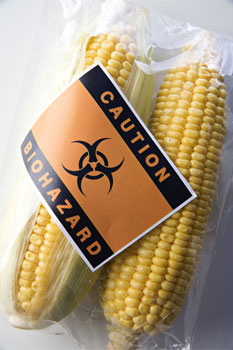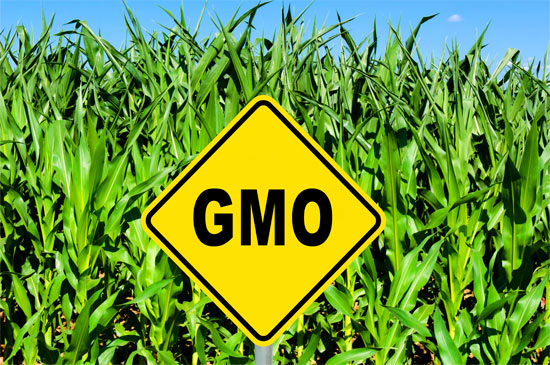What is Non-GMO?
Non-GMO means non-genetically modified. GMOs (genetically modified organisms), are novel organisms created in a laboratory using genetic modification/engineering techniques. Scientists and consumer and environmental groups have cited many health and environmental risks with foods containing GMOs. As a result of the risks, many people in the United States and around the world are demanding “non-GMO” foods.
What are genetically modified foods?
In genetic modification (or engineering) of food plants, scientists remove one or more genes from the DNA of another organism, such as a bacterium, virus, animal, or plant and “recombine” them into the DNA of the plant they want to alter. By adding these new genes, genetic engineers hope the plant will express the traits associated with the genes. For example, genetic engineers have transferred genes from a bacterium known as Bacillus thuringiensis or Bt into the DNA of corn. Bt genes express a protein that kills insects, and transferring the genes allows the corn to produce its own pesticide.Genetic modification/engineering is a potentially dangerous technology
One of the main problems with genetic engineering is that the process of inserting genes into the DNA of a food plant is random; scientists have no idea where the genes go. This can disrupt the functioning of other genes and create novel proteins that have never been in the food supply and could create toxins and allergens in foods.
Genetic modification is a radical technology
Supporters of genetic modification say that the technology is simply an extension of traditional plant breeding. The reality is that genetic engineering is radically different. Traditional plant breeders work with plants of the same or related species to create new plant varieties. Genetic engineers break down nature’s genetic barriers by allowing transfers of genes from bacteria, viruses, and even animals—with unforeseen consequences.
Genetic modification is based on an obsolete scientific theory
Genetic modification is based on a theory called the Central Dogma, which asserts that one gene will express one protein. However, scientists working with the United States National Human Genome Research Institute discovered that this wasn’t true, that genes operate in a complex network in ways that are not fully understood. This finding undermines the entire basis for genetic engineering.
What genetically modified crops are currently approved to be grown in the US?
- Corn
- Soybeans
- Cotton
- Canola
- Sugar beets
- Alfalfa
- Papaya
- Yellow “crook neck” squash
- Zucchini
- “Arctic” apple
- “Innate” potato
rBGH (Recombinant Bovine Growth Hormone)
About 10% - 15% of cows in the US are injected with a genetically modified bovine growth hormone called rBGH (rBST). rBGH is banned in many countries due to negative health impacts on cows. In the US, major food retailers and restaurants such as Wal-Mart, Safeway, Starbucks, and McDonald’s only sell or serve rBGH-free milk.Health Hazards of GM Foods

Below are several documented findings showing health dangers from GM foods.
-
GM corn and Roundup herbicide cause tumors and organ damage
Rats fed Monsanto’s GM corn NK603 and tiny amounts of Roundup herbicide over a two-year period—the longest ever feeding study involving a GM food—developed severe liver and kidney damage, disturbance to pituitary gland function, and hormonal disruption. Additional findings included increased rates of large tumors and premature deaths. The study was first published in the journal Food and Chemical Toxicology but was later retracted due to pressure by pro-GMO scientists and groups. It was later republished in Environmental Sciences Europe.
-
GM-fed pigs suffered severe stomach inflammation and heavier uteri
A study found that pigs fed GM corn and soy over 22.7 weeks suffered more severe stomach inflammation than pigs fed a non-GMO diet. GM-fed females had on average a 25% heavier uterus than non-GM-fed females, a possible indicator of disease that requires further investigation.
-
GM corn altered blood biochemistry, damaged organs, and caused potential effects on male fertility
Rats fed the GM Bt corn MON810 for 45 and 91 days showed differences in organ and body weights and in blood biochemistry, compared with rats fed a non-GMO variety grown side-by-side in the same conditions. The authors noted that the changes could indicate “potential adverse health/toxic effects,” which needed further investigation.
-
GM potatoes caused damage to mice intestines
Mice fed a diet of GM Bt potatoes showed abnormalities in the cells and structures of the small intestine, indicating mild damage to the intestines. A control group of mice fed non-GMO potatoes containing a naturally occurring Bt toxin showed no abnormalities. The test shows that the Bt toxin does not break down in digestion, as GMO proponents claim.
-
GM corn toxin found in blood of pregnant women
A study conducted in Canada detected significant levels of the insecticidal Bt corn protein, Cry1Ab, circulating in the blood of pregnant women and in the blood supply to unborn fetuses. This study again shows that the Bt toxin does not break down in digestion, as GMO proponents claim.
Environmental Hazards of GM Crops

-
GM crops increase pesticide use
-
GM crops creating “superweeds”
The widespread use of glyphosate herbicide used with herbicide tolerant GM corn, soybeans, canola, and cotton has led to the creation of herbicide resistant weeds, which now infest 60 millions of acres of farmland throughout the United States.
-
GM corn harms aquatic insects
A 2007 published study by Indiana University environmental science professor found that GM corn produced increased mortality and reduced growth in caddisflies, aquatic insects that are a food resource for higher organisms like fish and amphibians.
-
GMO contamination of organic and non-GMO crops causes hardships for farmers
Genetically modified crops are passing their transgenes to organic and non-GMO crops and causing farmers added costs and hardships. The risks and the effects of GMO contamination have unfairly burdened organic and non-GMO farmers with extra work, longer hours, and financial insecurity.
According to a study published by published by Washington State University research professor Charles Benbrook, GM crops have increased overall pesticide use by 404 million pounds from 1996 through 2011.
How to Avoid GM Foods

-
Avoid processed foods containing ingredients from corn, soy, canola, sugar beets, and cotton.
More than 70% of processed foods found in retail stores and restaurants contain ingredients derived from GE corn, soybeans, canola, and cotton. In addition, half the sugar used in food products comes from GM sugar beets.
- Look for Non-GMO Project verified products.
These food products have gone through a rigorous verification program to minimize the risk of GMO contamination, giving you the best assurance they are non-GMO.
For more information visit www.nongmoproject.org.
-
Eat organic.
Buying organic foods also offers assurance against the risks of genetic engineering because GM substances are prohibited in organic production.
- Buy locally grown foods.
There is nothing better than locally produced fresh fruits and vegetables. Buying local supports farmers and keeps food dollars in the community. Another option is a community supported agriculture (CSA) program, which you pay a membership fee to a local farmer and receive fresh organic produce throughout the growing season.
- Grow your own.
Gardening is a great hobby, nourishing to the body, mind, and soil. You can also participate in urban agriculture projects that are sprouting nationwide.
To learn more see Ken Roseboro’s books Genetically Altered Foods and Your Health and The Organic Food Handbook





